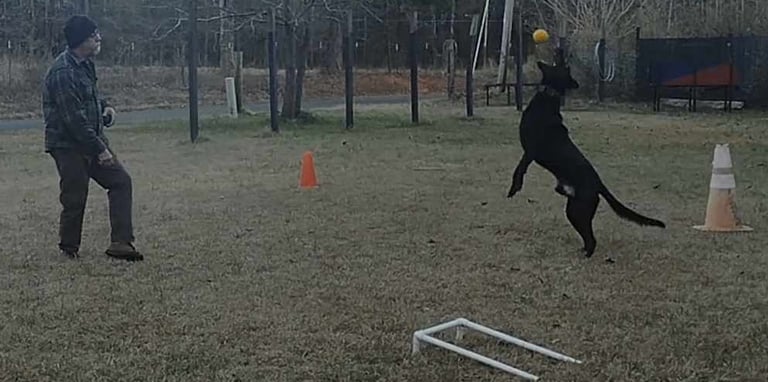NEW TSHIRTS AND K9 DRAGON FACTORY BRAND CLOTHING
Why Engaging with Your Dog is Crucial During Training
Why Engaging with Your Dog is Crucial During Training
K9 SCIENCEK9 TRAINING
B Anderson
6/3/20243 min read


The Importance of Full Engagement in Dog Training
Full engagement between a trainer and a dog is crucial for successful training outcomes. Engagement refers to the dog's focus, interest, and willingness to participate in training activities. Here are several reasons why achieving full engagement is vital:
1. Enhanced Learning and Retention
- Focused Attention: When a dog is fully engaged, it is paying close attention to the trainer and the task at hand. This focus is essential for learning new commands and behaviors, as it reduces distractions and increases the likelihood of retaining the training.
- Improved Comprehension: Engaged dogs are more likely to understand and respond correctly to training cues. They are more attuned to the trainer's signals and commands, which leads to quicker and more accurate learning.
2. Strengthened Bond and Trust
- Building Relationship: Training sessions that emphasize engagement help strengthen the bond between the dog and the trainer. Positive interactions during training foster trust and mutual respect, which are foundational for effective communication and cooperation.
- Mutual Respect: An engaged dog feels valued and understood, which reinforces a positive relationship. This mutual respect is critical for long-term training success and overall behavior management.
3. Increased Motivation and Enthusiasm
- Positive Reinforcement: Engaged dogs are often motivated by positive reinforcement techniques such as treats, praise, and play. This motivation keeps them enthusiastic and eager to participate in training sessions.
- Reduced Stress: Training that focuses on engagement tends to be more enjoyable and less stressful for the dog. An engaged dog is less likely to experience anxiety or frustration, leading to a more positive training environment.
4. Better Behavior and Obedience
- Consistency: Engagement ensures that the dog consistently follows commands and performs desired behaviors. This consistency is crucial for developing reliable obedience both during and outside of training sessions.
- Reduced Problem Behaviors: Engaged dogs are less likely to exhibit problem behaviors such as barking, jumping, or destructive chewing. Engagement keeps their minds occupied and provides a constructive outlet for their energy.
5. Customized and Adaptive Training
- Tailored Approach: An engaged dog provides feedback through its behavior and responses, allowing the trainer to adjust and tailor the training approach to suit the dog's individual needs and learning style.
- Real-Time Adjustments: Engagement allows trainers to make real-time adjustments during training sessions, ensuring that the dog remains interested and receptive to learning.
6. Safety and Control
- Improved Control: Full engagement gives the trainer better control over the dog, especially in situations that require immediate and precise responses. This control is essential for ensuring the safety of both the dog and others.
- Quick Response: Engaged dogs respond more quickly to commands, which is particularly important in high-stress or emergency situations where rapid compliance is necessary.
7. Enhanced Problem-Solving Skills
- Encourages Thinking: Engaged dogs are more likely to think critically and solve problems during training. This cognitive engagement helps develop their ability to make better decisions and adapt to new challenges. The material will always be taken in better if the dog is in a learning environment that fosters teamwork.
Achieving full engagement with the dog you are training is essential for effective, efficient, and enjoyable training sessions. It enhances learning and retention, strengthens the bond and trust between the dog and trainer, increases motivation and enthusiasm, improves behavior and obedience, allows for customized training approaches, ensures safety and control, and enhances the dog’s problem-solving skills. Prioritizing engagement in your training routine is a key factor in achieving long-term success and fostering a positive training experience for both you and your dog.
When training always be aware of the need for engagement and teamwork in the session. This will result in a dog that not only performs well but WANTS to be and get better.
Brian




